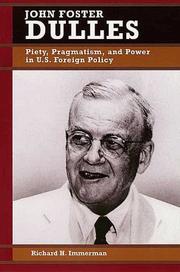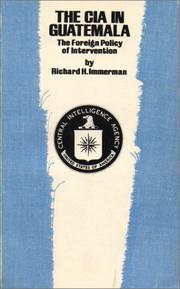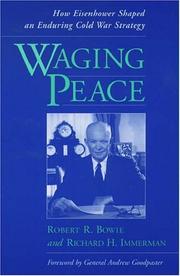| Listing 1 - 5 of 5 |
Sort by
|

ISBN: 0842026002 1461638011 9781461638018 9780842026017 Year: 1999 Publisher: Wilmington, Del. SR Books
Abstract | Keywords | Export | Availability | Bookmark
 Loading...
Loading...Choose an application
- Reference Manager
- EndNote
- RefWorks (Direct export to RefWorks)
John Foster Dulles was one of the most influential and controversial figures in the history of twentieth-century U.S. foreign relations. Active in the field for decades, Dulles reflected and was a reflection of the tension that pervaded U.S. international conduct from its evolution as a global power in the early twentieth century through its emergence as the 'leader of the Free World' during the Cold War. His life and career embody the best and most troubling aspects of American foreign policy as it progressed toward international supremacy while swaying between altruism and self-interest.
Statesmen --- Dulles, John Foster, --- United States --- Foreign relations --- Dulles, John Foster

ISBN: 0292756429 0292788673 9780292788671 0292710836 9780292710832 0292780451 9780292780453 Year: 1982 Publisher: Austin
Abstract | Keywords | Export | Availability | Bookmark
 Loading...
Loading...Choose an application
- Reference Manager
- EndNote
- RefWorks (Direct export to RefWorks)
United States. --- United States --- Guatemala --- Foreign relations
Book
ISBN: 9781479871438 9781479826902 9781479809080 147980908X 1479871435 1479826901 Year: 2015 Publisher: New York, NY
Abstract | Keywords | Export | Availability | Bookmark
 Loading...
Loading...Choose an application
- Reference Manager
- EndNote
- RefWorks (Direct export to RefWorks)
Choice Outstanding Academic Title of 2016Investigates the causes, conduct, and consequences of the recent American wars in Iraq and AfghanistanUnderstanding the United States’ wars in Iraq and Afghanistan is essential to understanding the United States in the first decade of the new millennium and beyond. These wars were pivotal to American foreign policy and international relations. They were expensive: in lives, in treasure, and in reputation. They raised critical ethical and legal questions; they provoked debates over policy, strategy, and war-planning; they helped to shape American domestic politics. And they highlighted a profound division among the American people: While more than two million Americans served in Iraq and Afghanistan, many in multiple deployments, the vast majority of Americans and their families remained untouched by and frequently barely aware of the wars conducted in their name, far from American shores, in regions about which they know little. Understanding the U.S. Wars in Iraq and Afghanistan gives us the first book-length expert historical analysis of these wars. It shows us how they began, what they teach us about the limits of the American military and diplomacy, and who fought them. It examines the lessons and legacies of wars whose outcomes may not be clear for decades. In 1945 few Americans could imagine that the country would be locked in a Cold War with the Soviet Union for decades; fewer could imagine how history would paint the era. Understanding the U.S. Wars in Iraq and Afghanistan begins to come to grips with the period when America became enmeshed in a succession of “low intensity” conflicts in the Middle East.
Afghaanse Oorlog, 2001 --- -Afghan War, 2001 --- -Afghanistan War --- Afghanistan [Guerre d' ], 2001 --- -Afghanistan--2001-....(Intervention américaine) --- Conflit américano-afghan (2001-....) --- Guerre américano-afghane (2001-....) --- Guerre d'Iraq, 2003-2011 --- Guerre en Afghanistan (2001-....) --- Intervention américaine en Afghanistan (2001-....) --- Irak--History--Anglo-Amerikaanse invasie, 2003-2011 --- Irakese oorlog, 2003-2011 --- Iraq War, 2003-2011 --- Iraq--Histoire--Invasion anglo-américaine, 2003-2011 --- Iraq--History--Anglo-American Invasion, 2003-2011 --- Afghan War, 2001 --- -Iraq War, 2003-2011 --- -Iraq War, 2003-2011. --- -Operation Enduring Freedom, 2001 --- -War on Terrorism, 2001-2009 --- Anglo-American Invasion of Iraq, 2003-2011 --- Dawn, Operation New, 2010-2011 --- Gulf War II, 2003-2011 --- Iraqi Freedom, Operation, 2003-2010 --- New Dawn, Operation, 2010-2011 --- Operation Iraqi Freedom, 2003-2010 --- Operation New Dawn, 2010-2011 --- Operation Telic, 2003-2011 --- Persian Gulf War, 2003-2011 --- Telic, Operation, 2003-2011 --- War on Terrorism, 2001-2009 --- Iraq War, 2003-2011. --- Afghan War, 2001-2021.

ISBN: 1280605448 0195362721 9780195362725 0195062647 9780195062649 9781280605444 0199879087 0197734405 Year: 1998 Publisher: New York Oxford Oxford University Press
Abstract | Keywords | Export | Availability | Bookmark
 Loading...
Loading...Choose an application
- Reference Manager
- EndNote
- RefWorks (Direct export to RefWorks)
This text offers a comprehensive study of Eisenhower's "New Look" programme of national security and the three decades of America's Cold War strategy. The authors examine "containment", the first strategy conceived to meet the nuclear threat.
National security --- History --- Eisenhower, Dwight D. --- Ai-sen-hao, --- Ėĭzenkhauėr, Duaĭt, --- Eisenhower, Ike, --- Ai-sen-hao-wei-erh, --- Ayzinhāvir, Duvāyt, --- ايزنهاور، دوايت --- Communist countries --- United States --- Iron curtain lands --- Russian satellites --- Second world (Communist countries) --- Soviet bloc --- Former communist countries --- ABŞ --- ABSh --- Ameerika Ühendriigid --- America (Republic) --- Amerika Birlăshmish Shtatlary --- Amerika Birlăşmi Ştatları --- Amerika Birlăşmiş Ştatları --- Amerika ka Kelenyalen Jamanaw --- Amerika Qūrama Shtattary --- Amerika Qŭshma Shtatlari --- Amerika Qushma Shtattary --- Amerika (Republic) --- Amerikai Egyesült Államok --- Amerikanʹ Veĭtʹsėndi︠a︡vks Shtattnė --- Amerikări Pĕrleshu̇llĕ Shtatsem --- Amerikas Forenede Stater --- Amerikayi Miatsʻyal Nahangner --- Ameriketako Estatu Batuak --- Amirika Carékat --- AQSh --- Ar. ha-B. --- Arhab --- Artsot ha-Berit --- Artzois Ha'bris --- Bí-kok --- Ē.P.A. --- EE.UU. --- Egyesült Államok --- ĒPA --- Estados Unidos --- Estados Unidos da América do Norte --- Estados Unidos de América --- Estaos Xuníos --- Estaos Xuníos d'América --- Estatos Unitos --- Estatos Unitos d'America --- Estats Units d'Amèrica --- Ètats-Unis d'Amèrica --- États-Unis d'Amérique --- Fareyniḳṭe Shṭaṭn --- Feriene Steaten --- Feriene Steaten fan Amearika --- Forente stater --- FS --- Hēnomenai Politeiai Amerikēs --- Hēnōmenes Politeies tēs Amerikēs --- Hiwsisayin Amerikayi Miatsʻeal Tērutʻiwnkʻ --- Istadus Unidus --- Jungtinės Amerikos valstybės --- Mei guo --- Mei-kuo --- Meiguo --- Mî-koet --- Miatsʻyal Nahangner --- Miguk --- Na Stàitean Aonaichte --- NSA --- S.U.A. --- SAD --- Saharat ʻAmērikā --- SASht --- Severo-Amerikanskie Shtaty --- Severo-Amerikanskie Soedinennye Shtaty --- Si︠e︡vero-Amerikanskīe Soedinennye Shtaty --- Sjedinjene Američke Države --- Soedinennye Shtaty Ameriki --- Soedinennye Shtaty Severnoĭ Ameriki --- Soedinennye Shtaty Si︠e︡vernoĭ Ameriki --- Spojené staty americké --- SShA --- Stadoù-Unanet Amerika --- Stáit Aontaithe Mheiriceá --- Stany Zjednoczone --- Stati Uniti --- Stati Uniti d'America --- Stâts Unîts --- Stâts Unîts di Americhe --- Steatyn Unnaneysit --- Steatyn Unnaneysit America --- SUA (Stati Uniti d'America) --- Sŭedineni amerikanski shtati --- Sŭedinenite shtati --- Tetã peteĩ reko Amérikagua --- U.S. --- U.S.A. --- United States of America --- Unol Daleithiau --- Unol Daleithiau America --- Unuiĝintaj Ŝtatoj de Ameriko --- US --- USA --- Usono --- Vaeinigte Staatn --- Vaeinigte Staatn vo Amerika --- Vereinigte Staaten --- Vereinigte Staaten von Amerika --- Verenigde State van Amerika --- Verenigde Staten --- VS --- VSA --- Wááshindoon Bikéyah Ałhidadiidzooígíí --- Wilāyāt al-Muttaḥidah --- Wilāyāt al-Muttaḥidah al-Amirīkīyah --- Wilāyāt al-Muttaḥidah al-Amrīkīyah --- Yhdysvallat --- Yunaeted Stet --- Yunaeted Stet blong Amerika --- ZDA --- Združene države Amerike --- Zʹi︠e︡dnani Derz︠h︡avy Ameryky --- Zjadnośone staty Ameriki --- Zluchanyi︠a︡ Shtaty Ameryki --- Zlucheni Derz︠h︡avy --- ZSA --- Η.Π.Α. --- Ηνωμένες Πολιτείες της Αμερικής --- Америка (Republic) --- Американь Вейтьсэндявкс Штаттнэ --- Америкӑри Пӗрлешӳллӗ Штатсем --- САЩ --- Съединените щати --- Злучаныя Штаты Амерыкі --- ولايات المتحدة --- ولايات المتّحدة الأمريكيّة --- ولايات المتحدة الامريكية --- 미국 --- Foreign relations --- Spojené obce severoamerické --- États-Unis --- É.-U. --- ÉU --- Eisenhower, Dwight David, --- Politics and government --- Military policy.
Book
ISBN: 0813179017 0813179025 9780813179025 9780813179001 Year: 2020 Publisher: Lexington, Kentucky
Abstract | Keywords | Export | Availability | Bookmark
 Loading...
Loading...Choose an application
- Reference Manager
- EndNote
- RefWorks (Direct export to RefWorks)
When the United States entered World War I, President Woodrow Wilson declared to Congress that the objective was not merely to bring 'a new balance of power,' but rather to bring a 'just and secure peace' to the world. In this famous speech, known as 'The Fourteen Points,' Wilson offered a road map toward a more equitable international system in the midst of global conflict, including ideas on the interconnectedness of democracy, trade, and the concept of a forum for resolving international disputes. Decades after World War I, Wilson's ideas continued to influence many of his successors. But now, there are forces in the world that Wilson could never have imagined, and those forces call for a new plan toward peace. Richard H. Immerman and Jeffrey A. Engel bring together a diverse group of thinkers who take up Wilson's call for a new world order by exploring fourteen new directions for the 21st century.
Peace. --- Wilson, Woodrow, --- United States --- Foreign relations
| Listing 1 - 5 of 5 |
Sort by
|

 Search
Search Feedback
Feedback About UniCat
About UniCat  Help
Help News
News